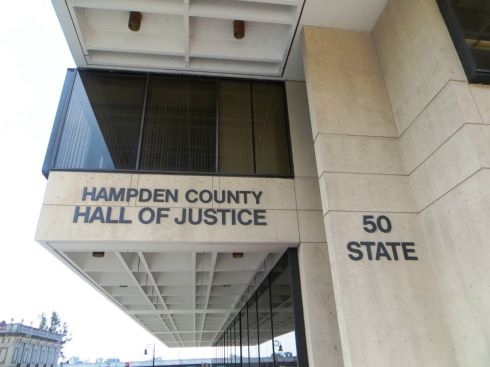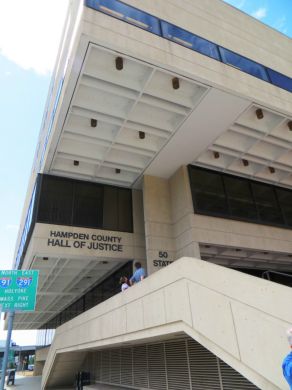Lawyers Suggest Different Portraits of Abuse Victim’s Mental Health
By Father Bill Pomerleau
Different portraits of the effects that Alfred F. Grave’s sexual abuse had on Andrew Nicastro, and his later motivations in launching a 2009 lawsuit, were the subject of contentious questioning July 26 in the civil trial of Springfield Bishop Emeritus Joseph F. Maguire and former Springfield Bishop Thomas L. Dupre. Nicastro, of Williamstown, alleges that the bishops acted negligently by returning the former priest to ministry with insufficient supervision after they knew that he had a history of abusing boys in other parishes. John J. Egan, Bishop Maguire’s attorney, began his cross-examination of Nicastro by suggesting that the now 41-year-old had told others about his abuse several years ago – this time using a document prepared by Nicastro himself with the help of his attorney, John Stobierski. “Yesterday you testified that you told your wife that you had been abused after a (1999) pre-Cana conference. Do you remember stating that in your interrogatory?” Egan asked, alluding to a 2010 document drawn up by the plaintiff in support of its case. “In the deposition? I don’t remember,” Nicastro replied. Under further questioning by Egan, Nicastro again denied that he had ever met sometime between 2000 and 2002 with Father William F. Cyr, pastor of St. Patrick Parish in Williamstown from 1989 to 2002. He stuck to his story when Egan mentioned that Patricia McManamy, the diocesan victim assistance coordinator, had mentioned the meeting in her intake report when she met with Nicastro in 2008. Later in the day Nicastro’s father, Anthony Nicastro, also denied meeting with Father Cyr during his testimony. During his cross-examination of the younger Nicastro, defense attorney Michael O. Jennings asked when he had become aware of the rules for the statute of limitations in civil cases. The jury heard that Andrew Nicasto, before engaging Stobierski, had consulted with another attorney, but Judge Constance Sweeney cut off further discussion of what was a likely privileged attorney-client conversation. After Andrew Nicastro finished testifying, one of his attorneys, John Connor, called Leigh-Anne Nicasto, Andrew’s wife, to the stand. She confirmed all of her husband’s previous testimony, describing how he would “shut down” after making cryptic, angry statements and suffered from periods of depression. She said that, on two occasions, she had considered leaving her husband. Leigh-Anne Nicastro insisted that while she had learned that her husband had been a victim of childhood sexual abuse shortly before her wedding in 1999, she never learned that he had been repeatedly abused by Graves until the couple met with McManamy in 2008. Anthony Nicastro had similar answers in his testimony, which ended the formal proceedings for the day. He said that he was “blissfully ignorant” of his son’s abuse of alcohol and drugs in high school, although he later grew increasingly concerned that Andrew had something weighing on his mind. The elder Nicastro also said that he only learned that Father Graves had abused his son in 2008. Cross examination of Anthony Nicastro will begin on Friday. At the end of the morning’s proceedings, Judge Sweeney dismissed the jury and made several procedural rulings and comments to the lawyers and the public in Superior Courtroom 3. The visibly annoyed judge chastised Nicastro’s legal team for arguing July 25 to exclude Father Cyr’s testimony on the grounds that it was privileged, then later contending that the meeting he testified about never occurred. “I don’t like the plaintiff’s offering contradictory theories in its own case,” she said. Judge Sweeney also scolded the defendants’ legal team. She criticized Bishop Dupre’s attorney, Charles K. Bergin, for “over-talking” while she was trying to rule on various legal points. “Every party here has strong interests in this case. The arguments are compelling, I get that. But we have to get beyond whether you’re right or wrong so that we can present a coherent record to the jury,” she said. Before adjourning for the day, Judge Sweeney ruled that several minutes of a videotaped deposition of Bishop Dupre will not be admitted into evidence in the trial.
Among other deletions, the jury will not hear Bishop Dupre explain exactly why he pled the Fifth Amendment to nearly all questions in his April 16, 2010 deposition. Bishop Dupre was bishop of Springfield in 2004 when The Republican newspaper was about to report that, as a priest, he had allegedly sexually abused two minors. After a police investigation, the bishop was criminally charged with rape, but the charges were almost immediately dropped by former Hampden County District Attorney William Bennett when it became apparent that his alleged action fell outside of the statute of limitations. Although the constitutionality of such a law would be a subject of discussion, there is a movement in Massachusetts to, post-facto, extend the statute of limitations in child abuse cases. Before adjourning, Judge Sweeney told jurors that testimony in the trial may conclude as early as Monday, and their deliberations could begin on Tuesday. (Editor’s note: See related stories in the “Regional News” section of iobserve.org.)
|
.
Any original material on these pages is copyright © BishopAccountability.org 2004. Reproduce freely with attribution.

